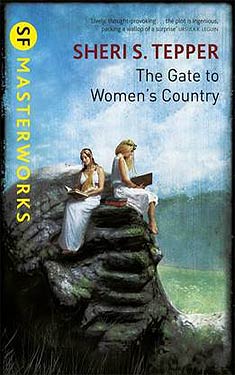Sherri S Tepper
Completed 2/4/2024, Reviewed 2/4/2024
2 stars
I did not like this book. I found it extremely irritating. It could be classed as ecofeminism, but I found it to be the most hateful book I’ve ever read. It does create empathy for the main character, but none for hardly anyone else. Almost every other character is unlikable, from the manipulating women to the violent men. It creates a worst-case dystopian future of gender separatism and suspicion. It almost felt like she was trying to one up “The Handmaid’s Tale” and failed. I have read quite a bit of feminist science fiction and often find it to be worthwhile and rewarding no matter how uncomfortable it makes me feel as a man. This book only succeeds in turning off the reader.
The story begins with Stavia finding out her son has decided to turn his back on Women’s Country and stay with the all-male warriors who live outside the city. It then jumps back in time to Stavia’s youth, where we learn more about the society in which she is being raised. Women get to stay in Women’s Country, getting educated, learning science, skills, and arts. Boys at the age of five are turned out, to be raised by the male warriors who protect the city. At the age of fifteen, they must choose whether to stay with the men outside or rejoin the women inside. The men who return also get education and help with the women’s society. Twice a year, the warriors come into town at Carnival and have sex with the women in a party-like, socially condoned celebrations. This is how new children are born. Then the cycle begins again for the boy children while the girl children get encultured.
Around the time Stavia is twelve, the warriors outside the city believe that the women hold some kind of secret weapon and should be overthrown. Women of course should not have weapons. They should only be making more warriors. So they send two young men to woo Stavia and her sister Myra and manipulate them romantically to get the secrets out of them. Stavia and Myra are daughters of a Councilwoman for the city, so the warriors believe her daughters would know any secrets the mother has. This leads to all sorts of trouble for Myra. However, Stavia is a pretty clear-thinking girl, but she does make some bad decisions. Her suitor-spy doesn’t try to have sex with her, but he does manipulate her into smuggling books out of the city, which is forbidden by ordinances. This only whets the appetite of the warriors for more information. The plot then follows the troubled relationship between Stavia and the young spy.
Assuming someone would like this story, there are technical problems with the book. The first half of the book is very dull. I thought the exploration of this society would be better than it was. Instead, it was so slow in parts, I think I lost brain cells. There is also a juxtaposition of a play about Iphigenia’s ghost returning to talk to Achilles and some some surviving woman from the battle of Troy. Through most of the book, its inclusion does not make sense, other than talking about the futility of war. It just makes for jarring interruptions in the story. The prose is okay, but not good enough to really enliven the world building.
One thing that really turned me off was the little aside that homosexuality was successfully bred out of the culture. This aberration was found to be a hormone imbalance that could be eradicated through breeding manipulation. My only thought at this point was “Fuck you, Miss Tepper! You can take your homophobic nonsense and shove it where the sun don’t shine!” I tried to recover my senses after reading that passage but never forgave Tepper. Even when she has the characters captured by an inbred, Fundamentalist Mormon-like enclave, I still kept one foot out of letting myself enjoy the suspense of how they were going to escape. And this was the one part of the book that actually had some decent pacing and excitement.
I liked one review I read that said this book was “gender essentialist, heterosexist, cissexist garbage.” Yes, it is all that, and every page reinforces it. Even the revelation of the big secret at the end couldn’t bring me to fully engage with the book. If you’re looking to read a book that stays relevant to the oppression women feel today, read “The Handmaid’s Tale.” Don’t read this. I give it two stars out of five solely because I thought Stavia was a good character and actually two of the men within the city, Joshua and Corrig, were relatable and empathetic. Without these three being written as they were, I would have given this book one star.

No comments:
Post a Comment